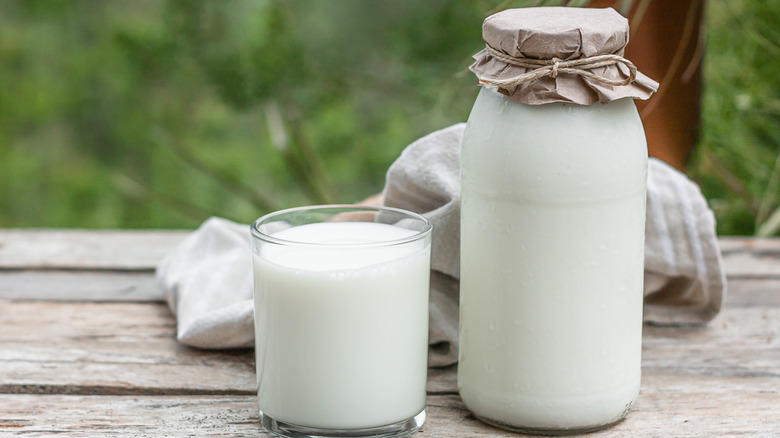Read This Before Throwing Out Expired Milk
Have you ever taken a big whiff of an opened carton of expired milk? The smell of spoiled dairy — somewhat equivalent to rotten eggs or smelly socks — is far from delightful. And while some may view expiration dates as "suggested" use by dates, drinking spoiled milk is never a smart idea. According to Healthline, consuming moderate quantities can result in food poisoning (though a sip won't be as harmful, if you do so by accident) — and side effects can include nausea, vomiting, diarrhea, and extreme stomach pain. But, there's good reason to not throw out that soured milk just yet!
In some instances, spoiled milk can be saved. It could be used as a substitute for buttermilk in recipes that call for that ingredient, like biscuits or pancakes. Likewise, you can also use expired milk to make your own cheese. If you're not too keen on either of those ideas, though, there's another alternative use for expired milk that doesn't require cooking or baking, or anything in the kitchen for that matter.
Plants love expired milk
In surprising news, expired milk that's been cut with water can actually help bring your plants back to life, according to The Kitchn! The science behind it is very similar to how humans utilize the nutrients in milk for healthy bone growth. In this case, plants use calcium for cell wall growth.
So, what exactly does calcium do? PRO-MIX explains that the mineral is one of three secondary nutrients needed for essential plant growth. Believe it or not, a plant can be calcium-deficient and, without the right amount, young leaves and root tips won't be able to fully mature. Plants lacking calcium, especially poinsettias, will start to have a discolored trim around the leaves. For poinsettias, it's typically a white color.
According to tips from The Kitchn, all you have to do to dilute the concentration by mixing equal parts of soured milk and water. Then, either pour the solution straight into the pot or use a spray bottle and saturate the plant's leaves directly. Both indoor and outdoor plants will benefit from this scientific concoction. And, even better, calcium can decrease the chances of powdery mildew on outdoor plants.

